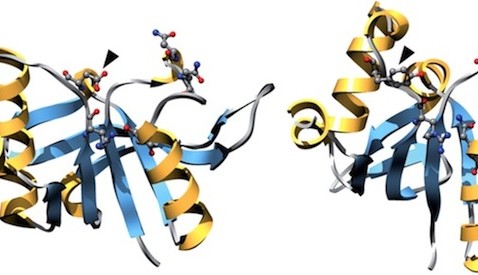Gamers Solve Problem That Riddled Scientists For 15 Years
September 21, 2011
on
on

Players of the online game Foldit produced accurate models of an enzyme. For over a decade scientists had been trying to determine the structure of the retroviral enzyme as it unlocks important information about battling the AIDS virus.
Foldit is a multiplayer game in which gamers are challenged to solve 3D puzzles. The gamers are given a model of a protein which they can manipulate. The best model is the one with the lowest energy score. To get a feel of the game watch the video below.
Players can form teams and compete with other. But ultimately they all work together for a higher purpose. Because the true goal of the game is to use human intuition to predict the structure of existing proteins. With that knowledge scientists can develop drugs for diseases in which proteins play a role such as Alzheimer’s, AIDS and cancer
Enzymes consist of a string of small molecules called amino acids. The amino acid sequence does not form a straight line but folds up in a specific shape. Each enzyme has its own unique shape that determines its function. In the name of science researchers try to predict the structure of proteins. But the number of possibilities is astronomical.
Scientists run computer simulations to go through all the possibilities. But the mathematical problem is simply to big to be solved by present day computing power.
So researchers of the Department of Biochemistry of the University of Washington asked themselves if the pattern recognition capabilities of humans could aid the computers’ performance. Computers can run the numbers but humans have spatial reasoning skills. In collaboration with their university’s Department of Computer Science and Engineering they developed Foldit.
After 15 years of trying to solve the crystal structure of the Mason-Pfizer Monkey Virus (M-PMV) retroviral protease, the researchers introduced the problem to the Foldit community. In three weeks two teams came up with a model accurate enough for the scientists to refine and determine the structure of the M-PMV retroviral protease.
M-PMV is an AIDS-causing virus and the retroviral proteases (PRs) play an important role in the process of multiplication once its inside its host. Solving its structure can help scientists to find a drug that stops the activity of the PR and prevent the virus from spreading.
The findings were published in Nature Structural and Molecular Biology. The paper Crystal Structure of a Monomeric Retroviral Protease Solved By Folding Game Players names the two contributing teams Foldit Contender Group and Foldit Void Crushers Group as co-authors.
On the Foldit website the researchers thank the community for their contribution to science. “We are so proud of everything that you Foldit players have accomplished already, and we hope that this article will show the world the power of citizen science! This is the first instance we are aware of in which online gamers solved a longstanding scientific problem and we want to thank you all for your amazing work on this and everything else.”
Photo source: pnas.org
Foldit is a multiplayer game in which gamers are challenged to solve 3D puzzles. The gamers are given a model of a protein which they can manipulate. The best model is the one with the lowest energy score. To get a feel of the game watch the video below.
Players can form teams and compete with other. But ultimately they all work together for a higher purpose. Because the true goal of the game is to use human intuition to predict the structure of existing proteins. With that knowledge scientists can develop drugs for diseases in which proteins play a role such as Alzheimer’s, AIDS and cancer
Enzymes consist of a string of small molecules called amino acids. The amino acid sequence does not form a straight line but folds up in a specific shape. Each enzyme has its own unique shape that determines its function. In the name of science researchers try to predict the structure of proteins. But the number of possibilities is astronomical.
Scientists run computer simulations to go through all the possibilities. But the mathematical problem is simply to big to be solved by present day computing power.
So researchers of the Department of Biochemistry of the University of Washington asked themselves if the pattern recognition capabilities of humans could aid the computers’ performance. Computers can run the numbers but humans have spatial reasoning skills. In collaboration with their university’s Department of Computer Science and Engineering they developed Foldit.
After 15 years of trying to solve the crystal structure of the Mason-Pfizer Monkey Virus (M-PMV) retroviral protease, the researchers introduced the problem to the Foldit community. In three weeks two teams came up with a model accurate enough for the scientists to refine and determine the structure of the M-PMV retroviral protease.
M-PMV is an AIDS-causing virus and the retroviral proteases (PRs) play an important role in the process of multiplication once its inside its host. Solving its structure can help scientists to find a drug that stops the activity of the PR and prevent the virus from spreading.
The findings were published in Nature Structural and Molecular Biology. The paper Crystal Structure of a Monomeric Retroviral Protease Solved By Folding Game Players names the two contributing teams Foldit Contender Group and Foldit Void Crushers Group as co-authors.
On the Foldit website the researchers thank the community for their contribution to science. “We are so proud of everything that you Foldit players have accomplished already, and we hope that this article will show the world the power of citizen science! This is the first instance we are aware of in which online gamers solved a longstanding scientific problem and we want to thank you all for your amazing work on this and everything else.”
Photo source: pnas.org
Read full article
Hide full article


Discussion (0 comments)